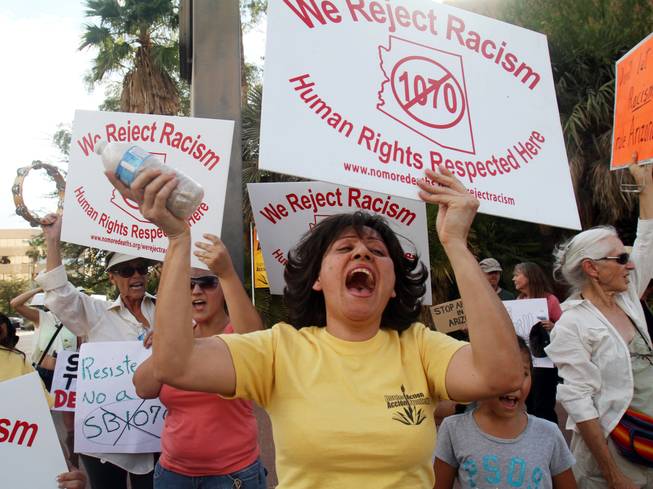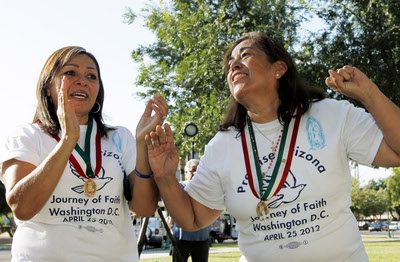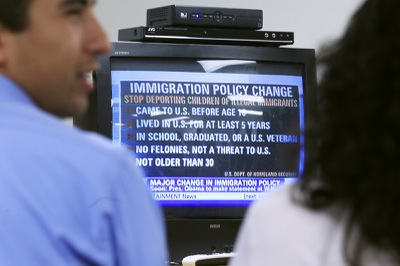
ASSOCIATED PRESS
Sofia Machado, center, chants along with a small crowd at the Arizona State Building in Tucson, Ariz., on Monday, June 25, 2012, during a rally after the U.S. Supreme Court’s decision on Arizona’s immigration law.
Tuesday, June 26, 2012 | 2 a.m.
SCOTUS Rules on Immigration Laws
The Supreme Court of the United States ruled on controversial immigration reform laws, striking down some aspects as being unconstitutional while upholding others. KSNV reports.
The Supreme Court’s partial preservation of Arizona’s immigration law isn’t likely to inspire any legal changes in Nevada. But driving east could get a whole lot trickier for Nevada’s minorities.
The court struck down three of four contested provisions of Arizona’s Senate Bill 1070 on Monday, stripping its most stringent provisions that had allowed state police to detain, arrest without a warrant and jail individuals only suspected of being undocumented.
But the decision maintained what opponents and proponents call the bedrock of the law: the police mandate to check the immigration status of anyone they pull over if there is the least suspicion that the person might be an undocumented immigrant.
Opponents of Arizona’s law call that institutionalized racial profiling. Supporters of Arizona’s law call it enforcement.
Either way, it creates a precedent for other states that have been waiting for the Supreme Court to pass judgment in this case to implement their own laws on roadside immigration checks.
Those states include Utah, where a law allowing status checks in some detention circumstances was temporarily suspended pending the Supreme Court’s decision in Arizona, and Idaho, one of the handful of states that supported Arizona’s petition and has considered instituting similar laws at home.
In other words, Nevada’s eastern and northeastern borders are now flanked by states that have or are looking to adopt stringent illegal immigration laws. That could pose problems for some Nevadans as they migrate from home.
As people head to and through Arizona, officers are waiting to check the immigration status of anyone whom they might encounter though routine enforcement of the public order.
“I would definitely advise people to be cautious about traveling,” said Fatima Marouf, who runs the Immigration Clinic at UNLV’s Boyd School of Law. “Even though the Arizona law says police can’t consider race or nationality in stopping people ... a lot of bias is implicit. It doesn’t have to be consciously considered.”
Because of the Supreme Court’s ruling, a Hispanic speeding to an important meeting in Phoenix is no longer in danger of being arrested on suspicion of being in the country illegally. But that person may still miss the appointment if there’s a delay in process.

Maria Durand, left, and Rosa Maria Soto, both from Arizona, cheer as the U.S. Supreme Court decision regarding Arizona's controversial immigration law, SB1070, comes down at the Arizona Capitol on Monday, June 25, 2012, in Phoenix. The Supreme Court struck down key provisions of Arizona’s crackdown on immigrants Monday but said a much-debated portion on checking suspects’ status could go forward.
For the undocumented immigrant, the risk is the same: Inability to prove residency at a routine traffic stop or other arbitrary detention could lead to deportation.
“Definitely, Latinos are going to be most at risk. So the burden is going to fall on Latinos who are here legally. ... Studies show that people don’t see them as being as American as whites,” Marouf said. “Naturalized, or even U.S.-born Latinos are going to be stopped a lot more.”
By comparison, people of Indian, Vietnamese, Korean and other Asian descent might be stopped far less because the assumption that they are in the country illegally isn’t as strong as for Hispanics, Marouf said. That’s despite the fact that many Asians immigrated illegally to the United States.
That’s no comfort to the Asian population in Las Vegas, however, who fear becoming ensnared in Arizona’s immigration laws.
“My niece and nephew go to school in Arizona, and I could see them being pulled over for no good reason because they are suspected of being an illegal immigrant,” said Amie Belmonte, the president of Filipino-American Political Organization with Equal Representation’s Las Vegas chapter. “What would it be based on? Nothing more than their name or the color of their skin?”
Democratic politicians echoed those fears on Monday in the wake of the court’s decision.
“Allowing Arizona to keep its ‘papers please’ system of immigration checks invites racial profiling,” Sen. Harry Reid warned after the Supreme Court released its decision. “As long as this provision remains, innocent American citizens are in danger of being detained by police unless they carry immigration papers with them at all times.”
President Barack Obama also voiced concerns about racial discrimination, even though the Justice Department declined the opportunity to argue on those grounds in the Arizona case.
“No American should ever live under a cloud of suspicion just because of what they look like. Going forward, we must ensure that Arizona law enforcement officials do not enforce this law in a manner that undermines the civil rights of Americans,” Obama said in a statement. “What this decision makes unmistakably clear is that Congress must act on comprehensive immigration reform. A patchwork of state laws is not a solution to our broken immigration system; it’s part of the problem.”
Perhaps the most unexpected outcome of the Supreme Court’s split decision Monday was the political unanimity it inspired. Both Republicans and Democrats called for a federal solution to the problem.
“Today’s decision underscores the need for a president who will lead on this critical issue and work in a bipartisan fashion to pursue a national immigration strategy,” Republican presidential candidate Mitt Romney said, blaming Obama for not having made good on his promise to handle immigration matters the last four years.
“I would have preferred to see the Supreme Court give more latitude to the states, not less,” he added.
Arizona Republicans cheered the Supreme Court’s decision as a win because it upheld the “heart” of SB1070. The court refused to rule on the legality of immigration checks during casual detentions because lower courts hadn’t yet had a chance to register an opinion on the practice.
Provisions that failed under the court’s scrutiny included criminalizing looking for work without proper documentation and being in the country without registration papers. The court also struck down a provision that would let police arrest suspected undocumented immigrants without a warrant.
But in Nevada, Republicans did not cheer the result. Instead, they deflected, addressing the tense political climate surrounding immigration in Washington instead of the merits of the court’s decision.
Some used the opportunity to take a shot at the president’s week-old announcement that he would grant temporary work visas to undocumented youths.
“States at the epicenter of our country’s illegal immigration issues are understandably frustrated with the administration’s selective enforcement of federal law,” Nevada Rep. Joe Heck said in a statement. “Short-term, politically motivated attempts to circumvent the need for meaningful reform will only compound the problem.”
Others complained that the federal government wasn’t doing enough to enforce the laws on the books.
“Enforcing the laws and improving the processing of immigration applications would go a long way toward fixing the current immigration system and keeping states from acting on their own,” said Stewart Bybee, a communications director for Sen. Dean Heller.
While Obama’s administration has recently announced stop-orders on certain types of deportation, mainly for undocumented youths brought to this country as children, his administration has made record deportations. Border crossings are also down.
But for Democrats — for Rep. Shelley Berkley especially — this is about the bigger political picture.
“I have opposed this law from the beginning while my opponent, Sen. Dean Heller, not only supports it but wants to bring it here to Nevada,” Berkley said after registering her qualms about the potential for racial profiling through what remains of what she calls Arizona’s “radical” law. “We cannot allow that to happen.”
Last year, Heller expressed his support for Arizona’s law in a public appearances and an interview, going so far as to say he would have voted for it were he in Arizona and that he would support a similar policy in Nevada.
But while the Supreme Court’s ruling on Arizona may touch off efforts to crack down on undocumented immigrants in other states, there’s not as much interest in Nevada as there is elsewhere. Gov. Brian Sandoval remains completely disinterested in seeing a march in Nevada toward any kind of Arizona law.
“I have always supported Arizona’s 10th Amendment right to enact laws,” Sandoval said Monday. “[I] have said all along the law is not needed in Nevada.”
Tovin Lapan contributed to this report.


Join the Discussion:
Check this out for a full explanation of our conversion to the LiveFyre commenting system and instructions on how to sign up for an account.
Full comments policy